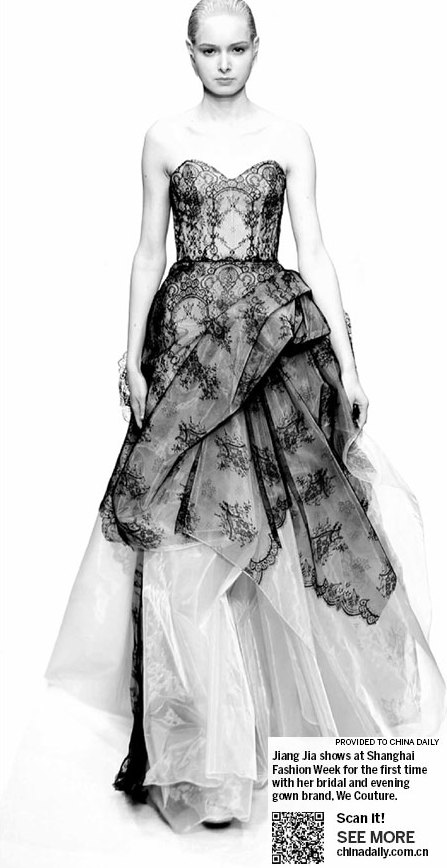Straining to stay in style in Shanghai
Updated: 2013-11-03 08:14
By Xu Junqian(China Daily)
|
|||||||||
It once attracted the world's trendsetters, but Shanghai's biannual fashion showcase is beginning to lose its luster. Xu Junqian finds out why slipping out of international style could prove a boon to the city's local talent.
As Shanghai Fashion Week, the biannual "most important fashion event" of the city limps into its 11th year, it is quickly becoming a less than glamorous event for serious fashionistas. While in previous years, the event attracted the likes of Jean Paul Gaultier and Vivienne Westwood to kick off festivities, the weeklong event has in recent years been losing its luster.
World-famous designers have already established their place and opened stores in China and find the domestic fashion week less than attractive. Domestic celebrities are busy being seen at the "Big Four" fashion weeks overseas (Paris, Milan, London and New York).
But organizers, fashion designers and fashion fans see the event's new local focus as a gain rather than a loss.
"As more and more retailers like Lane Crawford and Galeries Lafayette are opening their stores in China, it's crucial to 'spare a place' for and foster domestic fashion talent," says Zhang Jie, director of the commission of commerce of Shanghai's Huangpu district, the organizer of the event.
Shanghai Fashion Week has long been differentiating itself from the China International Fashion Week, its counterpart in Beijing, as the "cradle for independent designers".
This year, the metropolis is hosting 41 shows featuring 134 brands. Aside from the "group shows" presented by designers from countries like Canada, local designers make up the majority of the event.
This year's opening show is He He (meaning harmony and unity), by brothers Wu Xuewei and Wu Xuekai. The duo are the winners of the first rising talent fashion competition sponsored by the Fosun Charity Foundation, with the opening show being their award.
Another show to watch is the 2014 spring summer collection Peony Pavilion by Ji Cheng.
The "veteran participant" of the event was inspired by a classic romance story of the same name from ancient Chinese literature. Its femininity, exquisite cut and luxurious fabric, threaded with a subtle oriental touch, appeals to a young, creative and nostalgic woman, who wants to wear clothes that speak of Chinese culture.
Jiang Jia, a local designer who joined the event for the first time this fall with her brand, We Couture, believes Shanghai Fashion Week provides a "milestone-like platform" for local brands to go national, if not international.
"It doesn't necessarily boost sales. But, like a coming-of-age ceremony for a teenager or a test for a graduating student, participating in a Fashion Week is more ceremonial than commercial for a designer," says the 32-year-old Shanghai native.
The 20-minute debut runway show, featuring 33 gowns, kicked off at dusk on a weekday. It attracted about 600 people, including fashion reporters and peers in the industry. The absence of fashion buyers, however, is why industry insiders say the event cannot improve sales.
Jiang, a fashion design graduate, founded We Couture, a bridal and evening gown brand, with her classmate Wang Dequan five years ago, when she was preparing to get married but struggling to find her "perfect dress". She decided to take matters into her own hands.
"Things have gone pretty swimmingly," Jiang says, adding that her clientele is made up of people who "understand the culture of couture and can tell good from bad". The dresses made by Jiang are priced between 6,000 yuan to 40,000 yuan ($980-6,560).
But for the general public, or trendy young urbanites - potentially the largest consumers of the fashion industry in China - less glamour perhaps means more access to the 4,000-square-meter black tents set up on the artificial lake of Xintiandi, the city's fashion hub, as the main venue of the biannual Shanghai Fashion Week.
"Fashion Week is not only about celebrities, designers and models, but also those of us who eventually pay and put on those clothes when we walk the streets," Lin Jie, a 27-year-old account, tells China Daily prior to the We Couture show.
The Shanghai native who spends at least one-third of her salary on clothes and shoes every month says she got a ticket to the show from a friend who works for a public relations company.
"It (the ticket) is free, (the show) is close to my company and it's about fashion, so I came," she says. She asked to leave work early for the show and has dressed up especially for it. This is the first time Lin has seen a live fashion show or participated in a fashion week - "a concept" she learned of about 10 years ago from ELLE magazine.
"It's not as fancy as I thought, or read about in fashion magazines, but I feel part of the thing I like," she says. But she adds that she is unsure if she would attend next year. She has peeked behind the fashion curtain, her curiosity is already fading.
Contact the writer at xujunqian@chinadaily.com.cn.

(China Daily 11/03/2013 page13)